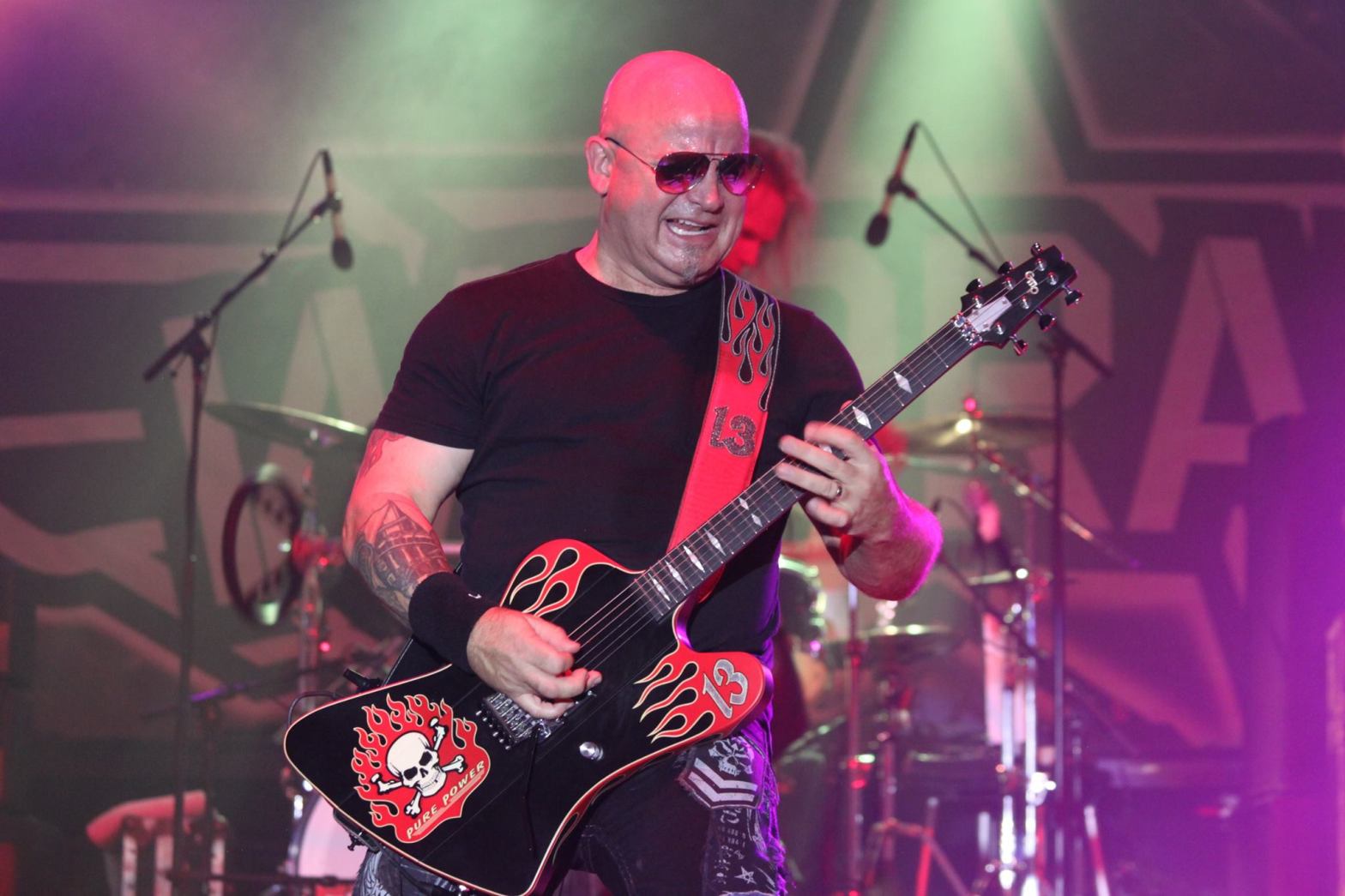
All images courtesy of Joey Allen
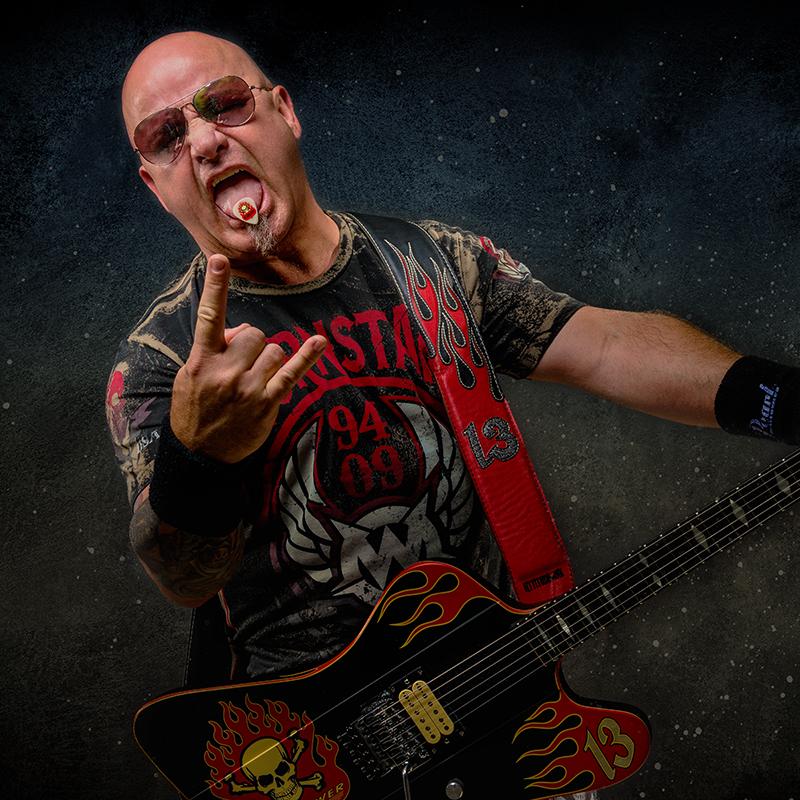
Late Warrant frontman Jani Lane once referred to Joey Allen as one of the most underrated guitarists in rock — a moniker that remains true to this day.
As a teenager, Allen formed an early bond with fellow guitarist Erik Turner when they shared the stage for a short time in a band called Knightmare II, initiating a bond that would forever alter the course of their respective careers.
Though the pair pursued vastly differing endeavors in the early 1980s – Turner co-founded Warrant in Los Angeles in 1984 while Allen achieved his Associate’s Degree in Electronic Engineering – by happenstance, their paths would cross once again. This time, it was a fateful run-in on L.A.’s Sunset Strip in 1986 that brought the two guitarists together. As it turned out, Warrant needed a guitarist, and Allen proved he had the chops to fill the void in a successful audition.
The reconfigured lineup generated significant buzz among the L.A. club circuit and soon garnered the attention of record labels. After weighing options, the band ultimately decided on Columbia Records.
Shortly after signing with Columbia, the band began working on their debut album, Dirty Rotten Filthy Stinking Rich. The album proved to be well-received, climbing to No. 10 on the Billboard 200. The hit singles “Heaven,” “Down Boys,” and “Sometimes She Cries” reached No. 2, No. 27, and No. 20 on the charts, respectively.
Warrant’s sophomore effort, Cherry Pie, proved to be a monumental success and the band’s most identifiable album. The 1990 classic achieved double platinum status; spawning hit singles such as “Uncle Tom’s Cabin,” “I Saw Red,” and most famously, the title track.
Thirty-one years and seven albums later, Warrant maintains an active touring schedule and continues to bring their trademark energy and showmanship to various venues across the country.
I recently sat down with one of the most underrated guitarists in rock himself, Joey Allen, to discuss his extensive career in music.
Andrew:
At what age did you first discover your passion for guitar, and who were some of your most integral musical influences?
Joey:
Simple stuff. I started playing cello in the second grade, and my cello teacher smacked me on the hand for playing the cello like a stand-up bass because I used to watch Hee Haw when I was a kid. So I started out in second grade, then I took a few years off, and I started guitar lessons in fifth grade and went on from there. Influences have to be stuff like KISS, Cheap Trick, Zeppelin — probably everybody’s influences from that era. Guitar player-wise, Eddie Van Halen, Randy Rhodes, Gary Moore, stuff like that. It’s pretty much the same answer if you ask any dude from my genre that plays guitar because there were only a few guys that really were standing out at the time. I could get into all kinds of music; I listened to Joe Jackson, I listened to The Knack, The Cars. I’m not one-sided where I just listen to rock or metal. I’m a music-lover; I’m a fan.
Andrew:
Your relationship with Erik Turner predates the Warrant days by a good bit, as you were both members of the band Knightmare II in the early 1980s. Did you play on any recordings?
Joey:
I did; Erik didn’t. Erik left and went up to L.A. and started Warrant. I stuck around and did a little EP [Death Do Us Part] with these guys; I think I was 15 or 16. But then I hopped around different bands around Orange County and did my thing while Erik started Warrant in L.A. So, yeah, prior to Warrant, Erik and I got together for a little while and jammed. Good times.
Andrew:
While Erik was in Los Angeles assembling the initial incarnation of Warrant, you stepped away from music for a bit to focus on your education. Did you and Erik remain connected?
Joey:
Back then, there weren’t cell phones. What’s funny is, I’m going through stuff at my parent’s house, and I found an old letter that Erik snail-mailed to me from a gig in 1984 when his band, Warrant, was playing the Troubadour; that’s when Warrant was just starting up. My band at the time was called Suspect, down here in Orange County, and my band was playing the Troubadour. We never really lost touch with one another, but we never really stayed in touch because it was hard to do back then. I literally bumped into him when I moved to L.A. in ’85; I bumped into him maybe a year or so later, late ’86 maybe; literally right across the street from Gazzarri’s and the whole Strip thing. We were both going out to have fun. They were looking for a guitar player, and about two weeks later, I auditioned and got the gig. About a year after that, we got signed to Columbia Records. So, it all happened pretty quickly once I got in the band. That’s what I like to tell everybody. [Laughs].
Andrew:
In your words, what was L.A.’s Sunset Strip like in the late 1980s?
Joey:
Starting Thursday night and Friday-Saturday rolling into Sunday, it was just mayhem. The streets were packed, and there were bands all over the place promoting shows, women all over the place, and everything that goes along with it. It was just a blast. I think we played once a month; like, we played two shows at The Country Club Friday and Saturday night, then we’d finish on a Sunday night at The Roxy or The Troubadour or The Whisky or Gazzarri’s. Then we had the other three weeks a month to go out and promote, so that’s what we did.
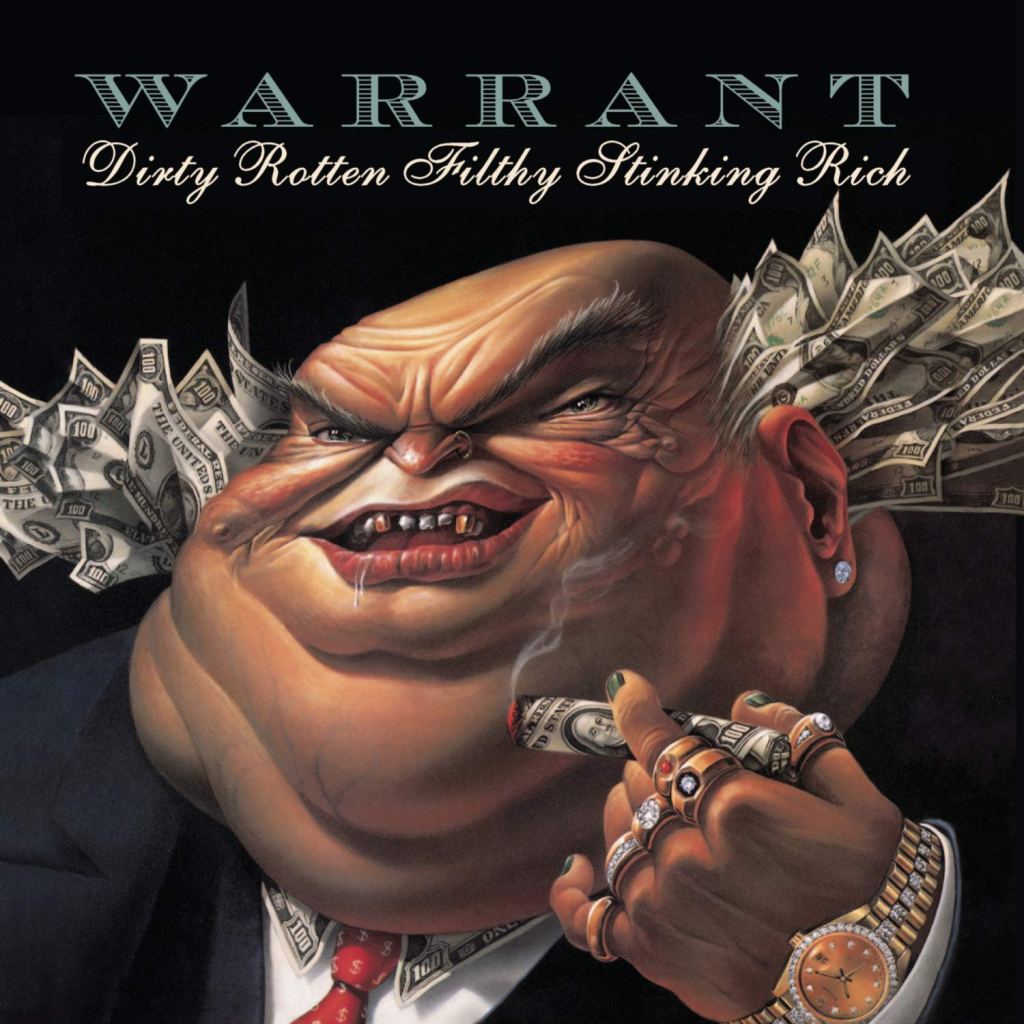
Andrew:
Dirty Rotten Filthy Stinking Rich has very unique cover art that has evoked various interpretations. Do you recall the origins behind the cover concept?
Joey:
Everybody’s got different memories. The way I remember it is we had two apartments in Van Nuys, California, prior to going nationally out on the road. We called it Van Hell. I remember sitting in Erik and Jani’s apartment trying to come up with an idea for the cover, and that was one of the songs. I remember this story, that I said, “Wouldn’t it be great if we had some ugly cat on the front cover that was like a music mogul and is gonna get dirty, rotten, filthy, stinking, rich off the band?” Then we ran with it; that’s what I remember. You never know, you ask another guy in the band, he might say, “Oh, it was my idea!” But I’m pretty sure unless I dreamt it, that’s how it went down. It’s been a long time.
Andrew:
I can only imagine the hijinks that took place during the Dr. Feelgood Tour. Do you have a favorite personal memory?
Joey:
I’ll tell ya a funny one. The last show was in Little Rock, Arkansas, I do believe, for us. [Motley] messed with us pretty good on stage, like taking our gear away while we’re playing, almost down to nothing, to where there’s one cabinet left plugged in. I mean, Motely was literally out on stage; Tommy Lee was one of them. Then, to get ‘em back, Jani and I dressed up like the Nasty Habits; they had these two backup singers, Amy and Donna, called the Nasty Habits back then. We dressed up like them in nurse outfits; total drag queen. And we were under their stage getting ready to go up on stage and do it, and Vince [Neil] came down during a drum solo and totally busted us under the stage. Then we promptly got kicked out of the arena. That was how we ended that tour.
Andrew:
What was the vibe like amongst the band on the heels of the recording Cherry Pie?
Joey:
It was the second record; we came off the road; we were just busy. We were super, super busy. Everybody was healthy, happy; Lane was doing good. It was probably when the band was starting to turn that corner because we were playing more and getting better and better live and better in the studio. We were getting ready to turn the corner on a new chapter to start the new record. You think everything is going to go great because you think you’ve made it, and right around the corner is the Seattle explosion. Which is great; some of those bands, I dig. It is what it is. Call it killing the genre or whatever; it didn’t kill it because we’re still able to go out and do as many shows as we want a year, and fifty percent of them are selling out. So, it didn’t kill anything; it just took a back seat for a while.
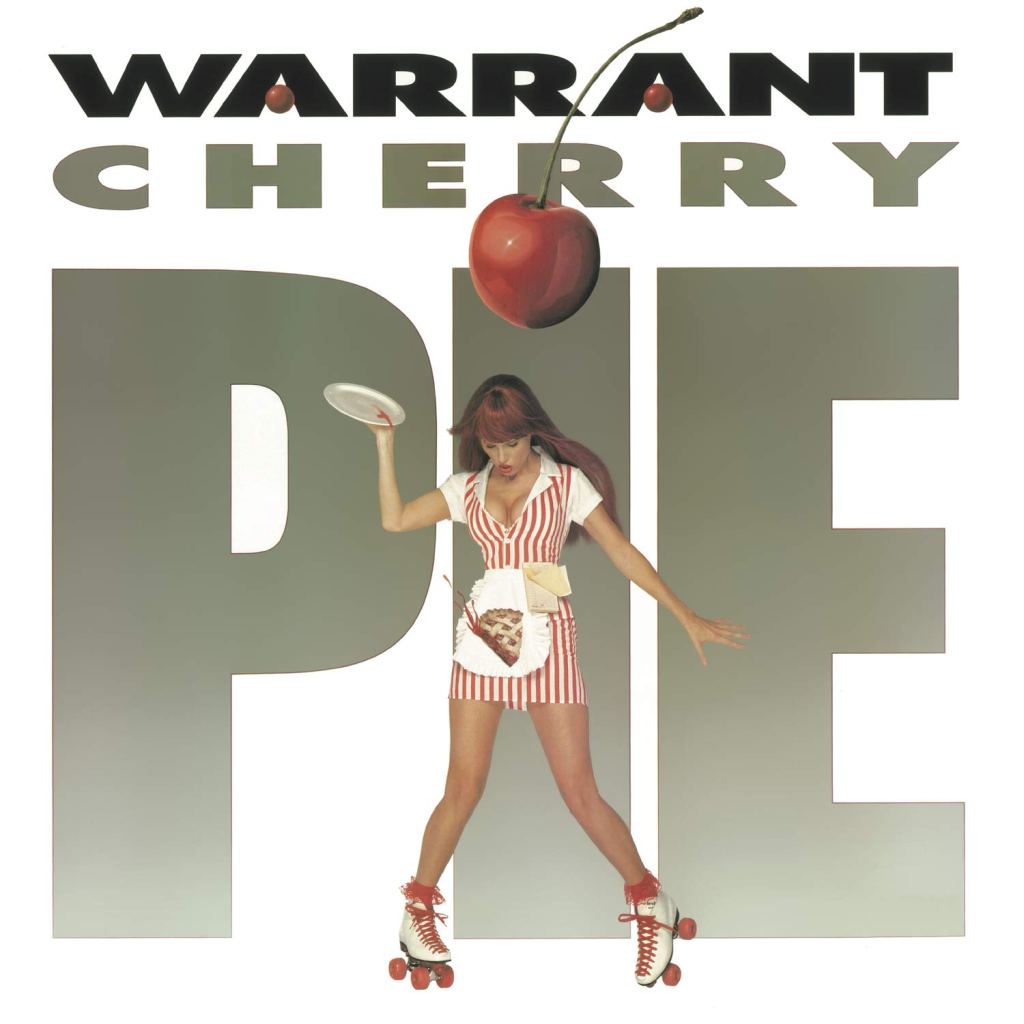
Andrew:
Cherry Pie ultimately proved to be the band’s breakthrough album, loaded with hit singles hits such as the title track, “I Saw Red,” “Uncle Tom’s Cabin,” and “Blind Faith.” Given the immense support received from MTV for the album, what was your favorite music video to shoot?
Joey:
The favorite video I’ve ever done is the one I’ve never made. I can’t stand videos; it’s a hurry-up-and-wait situation. For instance, the “Cherry Pie” video itself was a two-day shoot. I think I only shot one day with Jani. I had to shoot for two days because of all the prosthetics. So, you’re shooting a three-minute song once an hour, and in between shoots, all kinds of set changes are going on. It’s a different process. The guy that made that video, Jeff Stein, just recently commented on the 30th Anniversary of it. He’s a brilliant dude; I love Jeff. We did a few different videos with Jeff; one of them was “Cherry Pie,” one of them was the “We Will Rock You” remake that was in that movie Gladiator.
The “Uncle Tom’s Cabin” video was cool because it was the quickest shoot we ever had. It literally took half a day, and it was like, “Okay. See ya, guys!” Anytime something’s quick like that, it will be my favorite.
Andrew:
I have a question that I’m hoping you can clear up. Obviously, both you and Erik are credited for playing on the first two albums. However, there’s been a longstanding rumor that former Streets guitarist Mike Slamer handled all of the solo work. Is that at all accurate?
Joey:
That’s not accurate. Mike did play on both records, but he did not play all the solos; he played maybe half and I played pretty much the other half. Erik played the first solo on the first record – I’d have to go track-by-track, solo-by-solo. But Mike was my teacher. Mike was brought in by Beau Hill because Beau Hill thought there should be an Eddie Van Halen in the band and we weren’t that type of band at the time. So, he brought Mike in – and I don’t want to say it was forced because Mike’s a great guy – but it wasn’t like there was a lot of choice at the time. So, it just happened, and I’ve always been honest about it. Mike’s still a really good friend of mine and always will be.
For instance, part of “Heaven” – the solo in Heaven – most of it’s me; the tag end of it is Mike. It’s just stuff that happens in the studio that we never shied away from. Mike definitely played some stuff. We share the same thing in “Uncle Tom’s Cabin” – we share part of that solo. “Blind Faith;” all me; “Big Talk;” all me; “Sure Feels Good;” shared; “Bed of Roses;” all me. So, it just matters what track it is and really comes down to production. It was a different time back then; it is what it is. The producer thought he had to do it; he did it. We were young; we were like, “Okay, great.”
Andrew:
How receptive were you both to Beau’s bombshell?
Joey:
Not as receptive as he makes it sound in interviews. It’s kind of like you’re caught between a rock and a hard place. You got this producer that you hired to make a record, and he’s sitting here saying, “Well, we’re gonna have to bring some help in because you guys aren’t quite cutting it.” And we’re like, “Well, we’ve been cutting it probably for the past two years. Not a problem.” I mean, look, there’s some great riffs on there. There’s some great riffs that Mike played; there’s some great riffs that I played. I learned a lot from Mike because I didn’t want it to happen again. So, I started taking lessons hardcore from him because I’m like, “Wow, let’s get real and take that out if I can.” But he did it on the second record, and once he did it on the second record, we broke pace on the third record and went with Michael [Wagener]. That’s when we finally, strangely enough, didn’t have to do that again.
I still learn today. When I tour with somebody that’s doing something I’m not doing, I’ll go into their dressing room and say, “Hey, man. What are you doing for the next half hour? Let’s jam.” You can learn from anybody. I’ve never shied away from learning from other people, but I can hold my own; no problem.
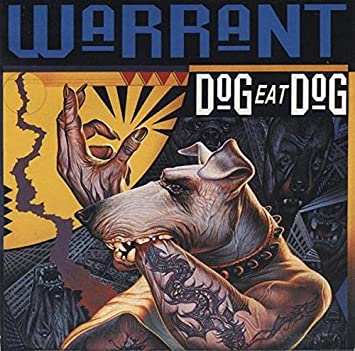
Andrew:
Warrant adopted a vastly different sound on Dog Eat Dog. Was there ever any thought that it could alienate some fans that may have been married to the sound of the first two albums?
Joey:
Never; we didn’t really care. As much as the fans make the band, if you start listening to people and what you should do and what you shouldn’t do, you’re gonna fail. You really gotta be true to what you want to do at any given moment. And that’s all we were doing. I think we were so pissed off that so many people were pigeon-holing us as such a light band, that we wanted to make a record that had some teeth. And that’s what we did. If that record would have come out first instead of Dirty Rotten, it would have been maybe a little different for the band. I don’t know. Not that it was a bad thing, but it was just a record that had to be made at the time and it was a lot of fun to make. The songwriting got even more complex; you’re bringing in orchestral arrangements and all kinds of different instruments into the fold.
Andrew:
Beau Hill obviously produced the first two albums, but the band opted to go with Michael Wagener for the follow-up album, Dog Eat Dog. What was it like working with such a renowned producer?
Joey:
This is what I remember. When we were down in Tampa — St. Pete — making that thing at Morrissound Studios. I remember Monday-Saturday at about 10:00, we had three or four condos down there, and we had like six or seven weeks down there where we were finishing that record, and we went to Morrissound Studios because that’s where all the Death Metal was being made; we thought we were just gonna get heavier and heavier. Those five-six days a week, from one condo, you’d hear this rental car. About two seconds later, it would break right in front of my condo, and you’d hear this “Dudeski!” And it would be Michael because I was always the first one in the studio; I’m an early bird. We’d get in the car, and Michael Wagener and I would drive to the studio together. Amazing amount of fun. Then I’d track for about four or five hours, and then I’d be done and go into my practice room and practice, practice, practice. And the other guys would come in and do their thing.
Andrew:
Is there an interesting story, inside or outside the studio, that you can share from your time in Tampa recording the album?
Joey:
Not really, other than it was just mayhem while we were making it. Every night of the week, we’d be out in Tampa at a club. We went to this club called the Rock-It Club every night. The owner did a deal with us, and we said, “Hey, man, we’re gonna come here every night after we’re done recording and drink. At the end of this record, we’ll play for you for free, and you can take care of our bar tab.” And so, for four, five, six weeks, we drank him under the table, and then we put a show up for sale in Tampa, and it sold out in ten minutes. He got his money back, and we all had a good time.
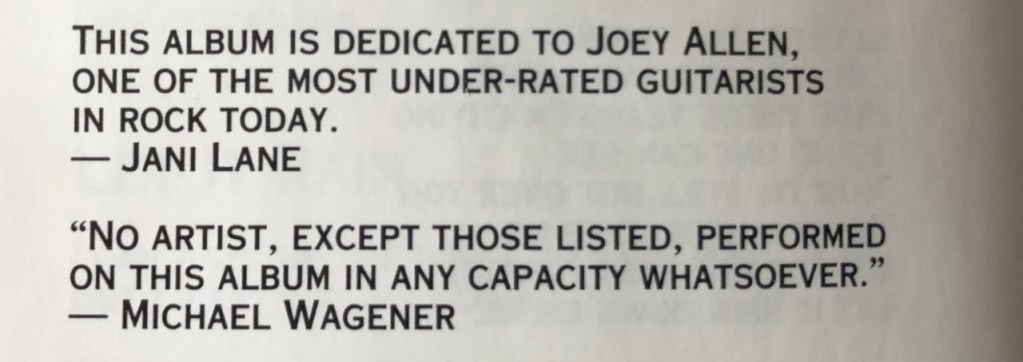
Andrew:
“Machine Gun” remains one of my favorite songs from the Warrant catalog. Do you have any recollection of the recording of that track?
Joey:
I remember what guitar I used when I recorded that solo and some of that fun stuff on that song. I remember a lot of that; I remember the amps. I used a Steinberger; Vito Bratta from White Lion used to use a Steinberger. It’s a stick, there’s no headstock, and it’s got a thing called a Trans Trem on it. When you dive on it, it goes down in tune. So, if you listen to all the guitar on that, any dive-bombs, the whole guitar is going down in tune. We had so much guitar gear there in that studio, and it was such a great time with Michael. Michael really, from Erik and I’s perspective – especially after working with Beau – was just on the guitars and turned them up and was into it. It was so easy to work with him compared to Beau. Making a record, it was night and day for me. No disrespect to Beau, Beau did what he did when he did it. But all of Michael’s records – every one of them, if you listen to them – have great guitar tones; great players, everything’s rockin’. Beau Hill is more of a drum and vocals mix guy.
[Michael’s] got a studio. We talked about working with him before we did the last record, Louder Harder Faster, but it just didn’t work out because he’s in Nashville, and we’re not. But I would work with Michael Wagner – my dudeski from another mother.
Andrew:
Dog Eat Dog deviated from the distinguished sound and perception of Warrant. Subsequently, the band landed the Fear of the Dark Tour, as well as Monsters of Rock with Black Sabbath, Iron Maiden, and Megadeth. The album seemingly altered the band’s trajectory overnight.
Joey:
It was because everybody was used to one thing. Shit, I grew up listening to Priest and Maiden and all that stuff and so did the other guys. We got a little heavy; we just wanted to do something different. We thought maybe this was what we should do, Jani was writing some dark songs, and away we went. I think when Columbia Records came down to listen to it, the President and everybody came down from New York down to Tampa to listen to rough mixes, and they were a little shocked. The president of Columbia thought we were his next Journey. We’re like, “No, we’ll play some rock ‘n’ roll.” No regrets at all for that record.
Andrew:
Warrant was among one of the few bands from its genre to prevail, despite the drastic musical shift of the early 1990s. What enabled the band to clear the hurdle and achieve success?
Joey:
Yeah, a lot of bands got eaten up. You know what it was, I think, is that the songs that Jani [Lane] wrote were just superior. I mean, the guy did have a knack for writing really good songs, and there’s a deep catalog there if you really listen to what was done. It’s a little deeper than a lot of the bands at the same time, I think; I’m a little biased, but it is what it is. There’s just deeper content there, and when it comes down to it, that’s what makes the difference.

Andrew:
Dog Eat Dog achieved gold status, and it appeared the band had found a new creative avenue to explore. However, you opted to leave the band in 1994 and pursue other interests. What prompted your departure?
Joey:
I was going through a divorce. I was out of my mind, to be honest with you; I was partying hard. At one point, I’m just like, “Fuck it. I don’t want to do this anymore. It’s not good for me. I gotta getaway.” I went away, went further down the rabbit hole of partying, and then I snapped out of that and went back to school. My father – who recently passed – he was my hero. He taught me a lot of things in life, and one of them was the importance of education. Anytime I’ve really had to reinvent, I looked towards education to help me do that and that’s what I did at that point, too. Five or six years later, after I got out of the education and worked privately in the IT world – because I went and got Microsoft certified as a database admin for a while – I got out of it and back into the band. So, everything comes full circle.
It was something that I just did, and to be honest with you, if I didn’t do it, I wouldn’t be where I am now. Because I still work in the private sector. When I tour, I work 70-80 hours a week, so I come from the lineage of, “Nothing beats hard work.” And it’s always paid off extremely well for me just to work my ass off and be relentless in what I do. I do it with my band; I do it when I tour; I have a lot of fun, but it’s very important for me to sound as good as I possibly can. A lot of care goes in. I figure if you can’t win by looks, you can beat the hell out of ‘em by being the first one to show up every day and never quitting. Ever.
Andrew:
So, you were gone for the better part of ten years and decided to come back. How exactly did you reenter the picture?
Joey:
Something like that, yeah. Might have been eight, really, I think. I got an email from Erik; this was when email world was going on. He just said, “Call me. Jani, Jerry, and [Erik] are the only three left in the band.” And he said, “Since Jani is doing this, we’re not gonna play with him. Jerry and I got the name, we wanna do this and that. Do you wanna jam?” And I said, “Sure.” And I went up and jammed and it was fun. Then I got ahold of Steven [Sweet], who I kept in touch with; I brought Steven on board and it was four of us. We did the thing with Jaime St. James for three or four years, then Jani came back for a failed reunion. Unfortunately, he was just having a really tough time struggling with abuse; alcohol mainly. That’s when I ran into Robert Mason, who was an old friend of the band and toured with us when he was in Lynch Mob. He was so off our radar that when I saw him, I thought he was the Messiah, like, “Oh my God, here’s our savior.” He was the guy that was gonna help us out because we didn’t think that Lane was gonna have such a hard time. It was disheartening. We could have just said, “Fuck it. We quit,” at that point; but again, coining back to just being relentless and sticking to it.
It’s worked out; the band’s doing great. We miss Lane, of course; tragic, fucking horrific thing to lose a brother like that. We’re a pretty private band and private people when it comes to stuff like that. It’s tough, man. Every day we miss the guy. Even Robert; Robert was good friends with him. There’s no weird animosity, and there wasn’t before he passed; we were all solid. He wanted to get back in the band, but he wasn’t well. You’re watching your friend die right in front of you, and you don’t want to be leading him to his grave. That’s as bluntly as I can put it. We were on tour with him, and Jerry just said, “I can’t do this anymore, or he’s gonna die.” That’s what it was. It wasn’t like, “You’re fired,” or anything like that. It’s just like, “Go home and get well.” I think if he really would have turned a corner and gotten sober for good, I’m sure we would have worked it out and been back together with time. But it was too soon when he first came at us, and everything was going great with Robert at the time. The last thing we wanted to do was jump back in and take some crazy fucking chance that he was gonna be okay.
Andrew:
Over three decades have elapsed since the release of Dirty Rotten Stinking Filthy Rich, yet the band still manages to capture the vintage Warrant sound in a live setting. Where does that energy come from after all these years?
Joey:
You’re gonna trip out on this. We did a show in 2019 in Montana with one of my favorite bands, Cheap Trick. I’m tight with Daxx, Rick’s son because he was a Warrant fan growing up and used to bum his dad out and play Warrant all the time when they would go on family vacations. I think he told me the first time that his dad ever got him headphones was because he was playing too much Warrant. [Laughs]. But we were doing a show with them in Montana, and I’m backstage talking with Tom Petersson. I was just looking for some older brother advice. I go, “Man, how can you keep on doing this over and over, and you’re so good at it?” He just looks at me, and he goes, “It’s what we do. It’s what we do.” And it was so simple but so well put. It had a very profound effect on me, so anytime anybody asks me what keeps you going and how do you guys keep it together – it’s just what we do; it’s who we are. And we’re good at what we do.

Andrew:
I had the pleasure of seeing you guys at the 2017 M3 Festival and recall being away blown away by the band’s performance and showmanship.
Joey:
M3, we love Maryland. I have fond memories of Hammerjacks. The goddamn Kix band from out there, we love them to death. Awesome band; I love Kix. In fact, when Jani quit the band the first time in like – I don’t know when it was, ’93 or something – I reached out to Stevie [Whiteman] from Kix and asked him if he wanted to get together and have some fun. He was very locked into Kix, which is nice to see. I don’t think his band guys liked me much because I did that. [Laughs].
Andrew:
When you returned to Warrant after nearly a decade removed from the industry, had you remained musically active during those years, or did you have to get back into playing shape?
Joey:
I absolutely had to get into playing shape when I was coming back—this pandemic thing I took, for the most part, a year off of playing. I haven’t played for the past year. But now that I know, sans any madness, that we’re gonna be playing come June. I started to practice again; I write the setlist for the band, so I’ve got the setlist and literally in the last few weeks started playing, and I’m having no problem hopping back on. In fact, it’s better now than it was a year or so ago because I’m going, “Well, I’m gonna go back through this stuff with a fine-tooth comb and really listen to what I did on the records and dial it in.” So, it’s gonna be pretty much like the records – even the Mike parts. [Laughs].
Andrew:
I know you’re very much a forward-thinking person, but looking back on the legacy of Warrant, what are you most proud of?
Joey:
I don’t think of it that way. To me, it’s just a band. We’re just dudes that have grown up together playing music. The accomplishments – all the records sold, the gold and platinum records, and all that stuff – that’s not anything I really look at. It’s hard for me to look back at the legacy of the band because I just don’t think in those ways. I’m more of an in-the-moment guy. I think it’s good, nowadays, that we can go out and play live and that people can come to shows and really enjoy it. Just really enjoy it, have some good memories, and forget about a shitty day for a minute or two. That’s what it really comes down to for me. It’s still exciting to get up there and play on stage. Every night that the lights go down, and the crowd roars up, it’s fucking exciting. Every single time. So, we’re looking forward to getting back out there and having some fun.
Andrew:
Lastly, Joey, what lies ahead for you and the band?
Joey:
We got the tour that we had last year; most of it’s rebooked for later this year – June, July, August, September, October, November, and December. I don’t know if you’ll hear any new music from us anytime soon; we took the year off. A few of the guys were like, “Let’s do something online.” And a few of us were like, “No. Let’s just go away. Let’s take a break.” We haven’t taken a break in the last 14, 15, or 16 years, so that’s what we did. We’re gonna come out bigger and badder than we have in the past because everybody’s doing what I’m doing at home; they’re all dialing in everything we’ve done before and taking out the lazy that was there. There’s a lot of laziness that happens when you fall into a groove, and you just play over and over and over. We’re dying to get out there, so there’s a newborn sense of being ready to kick ass. There’s no other way to put it. We’re fired up.
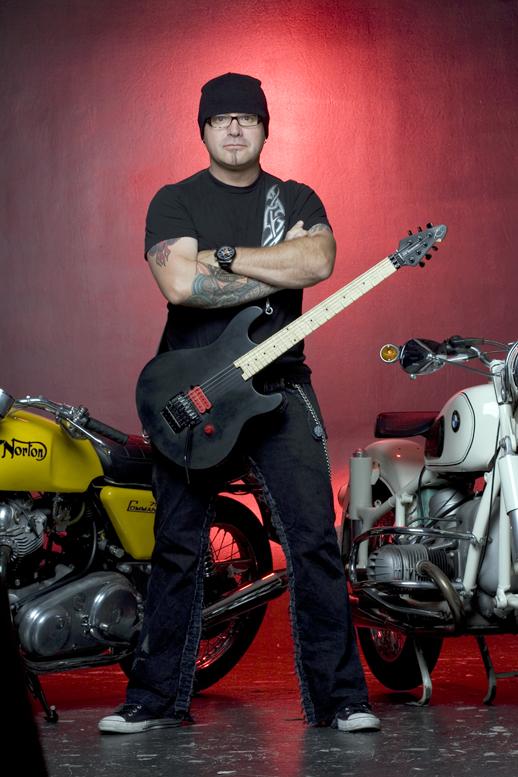
Interested in learning more about Warrant? Check out the video below:
Dig this article? Check out the full archives of Shredful Compositions, by Andrew DiCecco, here: https://vwmusicrocks.com/shredful-compositions-archives/

The solo on Let it Rain is one of the best ever.
It sure is! Joey is super talented. Very much looking forward to catching them live next month.